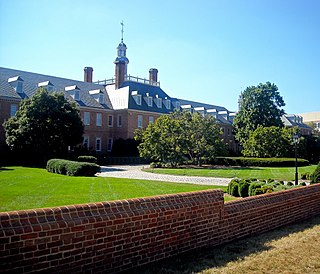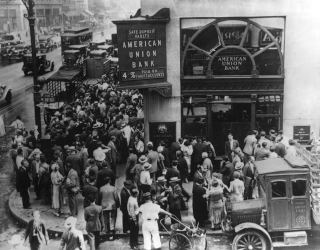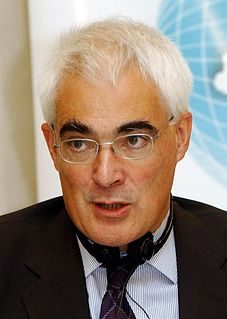
The Overseas Private Investment Corporation (OPIC) is the United States government's development finance institution. It mobilizes private capital to help solve critical development challenges and, in doing so, advances the foreign policy of the United States and national security objectives.

The Federal National Mortgage Association (FNMA), commonly known as Fannie Mae, is a United States government-sponsored enterprise (GSE) and, since 1968, a publicly traded company. Founded in 1938 during the Great Depression as part of the New Deal, the corporation's purpose is to expand the secondary mortgage market by securitizing mortgage loans in the form of mortgage-backed securities (MBS), allowing lenders to reinvest their assets into more lending and in effect increasing the number of lenders in the mortgage market by reducing the reliance on locally based savings and loan associations. Its brother organization is the Federal Home Loan Mortgage Corporation (FHLMC), better known as Freddie Mac. As of 2018, Fannie Mae is ranked #21 on the Fortune 500 rankings of the largest United States corporations by total revenue.
Small and medium-sized enterprises (SMEs) or small and medium-sized businesses (SMBs) are businesses whose personnel numbers fall below certain limits. The abbreviation "SME" is used by international organizations such as the World Bank, the United Nations and the World Trade Organization (WTO).
A government-sponsored enterprise (GSE) is a type of financial services corporation created by the United States Congress. Their intended function is to enhance the flow of credit to targeted sectors of the economy and to make those segments of the capital market more efficient and transparent, and to reduce the risk to investors and other suppliers of capital. The desired effect of the GSEs is to enhance the availability and reduce the cost of credit to the targeted borrowing sectors primarily by reducing the risk of capital losses to investors: agriculture, home finance and education. Well known GSEs are the Federal National Mortgage Association, or Fannie Mae, and the Federal Home Loan Mortgage Corporation, or Freddie Mac.

Deposit insurance is a measure implemented in many countries to protect bank depositors, in full or in part, from losses caused by a bank's inability to pay its debts when due. Deposit insurance systems are one component of a financial system safety net that promotes financial stability.
A micro-enterprise is generally defined as a small business employing nine people or fewer, and having a balance sheet or turnover less than a certain amount. The terms microenterprise and microbusiness have the same meaning, though traditionally when referring to a small business financed by microcredit the term microenterprise is often used. Similarly, when referring to a small, usually legal business that is not financed by microcredit, the term microbusiness is often used. Internationally, most microenterprises are family businesses employing one or two persons. Most microenterprise owners are primarily interested in earning a living to support themselves and their families. They only grow the business when something in their lives changes and they need to generate a larger income. According to information found on the Census.gov website, microenterprises make up 95% of the 28 million US companies tracked by the census.
A loan guarantee, in finance, is a promise by one party to assume the debt obligation of a borrower if that borrower defaults. A guarantee can be limited or unlimited, making the guarantor liable for only a portion or all of the debt.
SME finance is the funding of small and medium-sized enterprises, and represents a major function of the general business finance market – in which capital for different types of firms are supplied, acquired, and costed or priced. Capital is supplied through the business finance market in the form of bank loans and overdrafts; leasing and hire-purchase arrangements; equity/corporate bond issues; venture capital or private equity; asset-based finance such as factoring and invoice discounting, and government funding in the form of grants or loans.

A bank rescue package totalling some £500 billion was announced by the British government on 8 October 2008, as a response to the ongoing global financial crisis. After two unsteady weeks at the end of September, the first week of October had seen major falls in the stock market and severe worries about the stability of British banks. The plan aimed to restore market confidence and help stabilise the British banking system, and provided for a range of what was claimed to be short-term "loans" from the taxpayer and guarantees of interbank lending, including up to £50 billion of taxpayer "investment" in the banks themselves. In fact some of these loans and investments, via shareholdings, have since been sold back to the market at huge losses to the taxpayer.
Enterprise Capital Funds are financial schemes established by the Department for Business, Innovation and Skills (BIS) in the United Kingdom to address a market weakness in the provision of equity finance to UK small and medium enterprises (SMEs). Government funding is used alongside private sector funds to establish funds that operate within the "equity gap"; targeting investments of up to £2 million that have the potential to provide a good commercial return. The first five funds supported under the scheme were launched in 2006-7 following a pathfinder competition. A further three funds were awarded ECF status in 2007. As of March 2017, 23 ECFs have been launched.

The post-2008 Irish banking crisis was the situation whereby, due to the Great Recession, a number of Irish financial institutions faced almost imminent collapse due to insolvency. In response, the Irish government instigated a €64 billion bank bailout. This then led to a number of unexpected revelations about the business affairs of some banks and business people. Ultimately, added onto the deepening recession in the country, the banks bailout was the primary reason for the Irish government requiring IMF assistance and a total restructuring of the Irish Government occurred as result of this.

Yes Bank Limited is India's fourth largest private sector bank, founded by Rana Kapoor and Ashok Kapur in 2004. It primarily operates as a corporate bank, with retail banking and asset management as subsidiary functions.

The Icelandic loan guarantees referendum, also known as the Icesave referendum, was held in Iceland on 6 March 2010.

Groupe BPCE is a French banking group, formed by the 2009 merger of CNCE and BFBP, has more than 8,200 branches nationwide under their respective brand names serving nearly 40 million customers. Through its subsidiaries, it provides banking, financial, and real estate financing services to individuals, professionals, small and medium enterprises, large enterprises, and institutions in France and internationally.
Skipton Business Finance is a UK factoring and Invoice discounting company, founded and based in Skipton, North Yorkshire. It is a wholly owned subsidiary of Skipton Building Society.
South Canterbury Finance was New Zealand's largest locally owned finance company when it collapsed in August 2010, triggering a $1.6 billion bail-out of investors deposits by the New Zealand Government; almost $1b was recovered by receivers.
Capital for Enterprise Limited (CfEL) was a limited company in the United Kingdom owned by the Department for Business, Innovation and Skills (BIS). CfEL was responsible for managing BIS's financial schemes, such as venture capital funds and loan guarantees, aimed at helping small and medium enterprises (SMEs). It invested over £1.8 billion from its formation and alongside private capital provided £6.5 billion in credit for SMEs. It ceased operating independently on 1 October 2013 and became part of the British Business Bank.
The Start Up Loans Scheme is a UK government backed programme that offers finance, mentoring and support to entrepreneurs looking to start a business in England, Scotland, Wales and Northern Ireland.

British Business Bank plc (BBB) is a state-owned economic development bank established by the UK Government. Its aim is to increase the supply of credit to small and medium enterprises (SMEs) as well as providing business advice services. It is structured as a public limited company and is owned by the Department for Business, Energy and Industrial Strategy. The bank has its headquarters in Sheffield.










